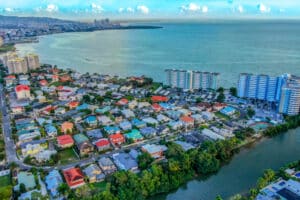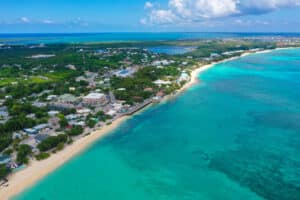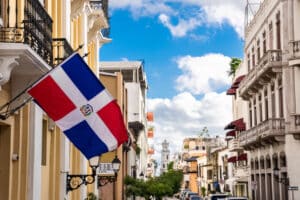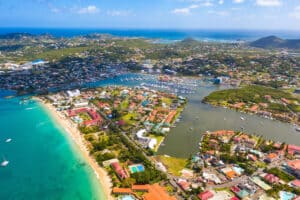Around one million tourists visited Curacao in 2022. But is the island as safe as it is popular?
The short answer to that question is yes: Curacao is both beautiful and safe. It’s a great destination if you like sandy beaches, eclectic Dutch-inspired architecture, and rich national parks, but also want peace of mind.
Let us cover everything you need to know about Caracao’s safety – including crime rates, safety tips, the prevalence of natural disasters, and much more – so you can enjoy your vacation without any worries.
Are you planning a last-minute trip to Curacao? We’ve put together all the resources you’ll need for a fun & safe travel:
🛌 Best & Safest Places to Stay in Curacao:
👉 Curaçao Marriott Beach – Sea view, Garden, 4 restaurants
👉 Dreams Curacao Resort – Pets allowed, Key card access, Sea view
👉 Sandals Royal Curacao – (Serene environment for couples)
👉 Scuba Lodge & Suites – 2 swimming pools, Family rooms, Non-smoking rooms
⛱️ Fun Activities & Tours in Curacao:
👉 Boat Trip to Klein Curacao
👉 Curacao Guided Underwater Walking Tour No swimming skills needed
👉 Curacao Half Day ATV East Adventure Tour
🚗 Best & Safest Curacao Transportation Services:
👉 Airport Pickup Service – Welcome Pickups
👉 Rent a Car – DiscoverCars
🙏 Stay Safe While Travelling:
👉 Safetywing (for medical insurance)
👉 VisitorsCoverage (for trip insurance)
Is Curacao Safe?
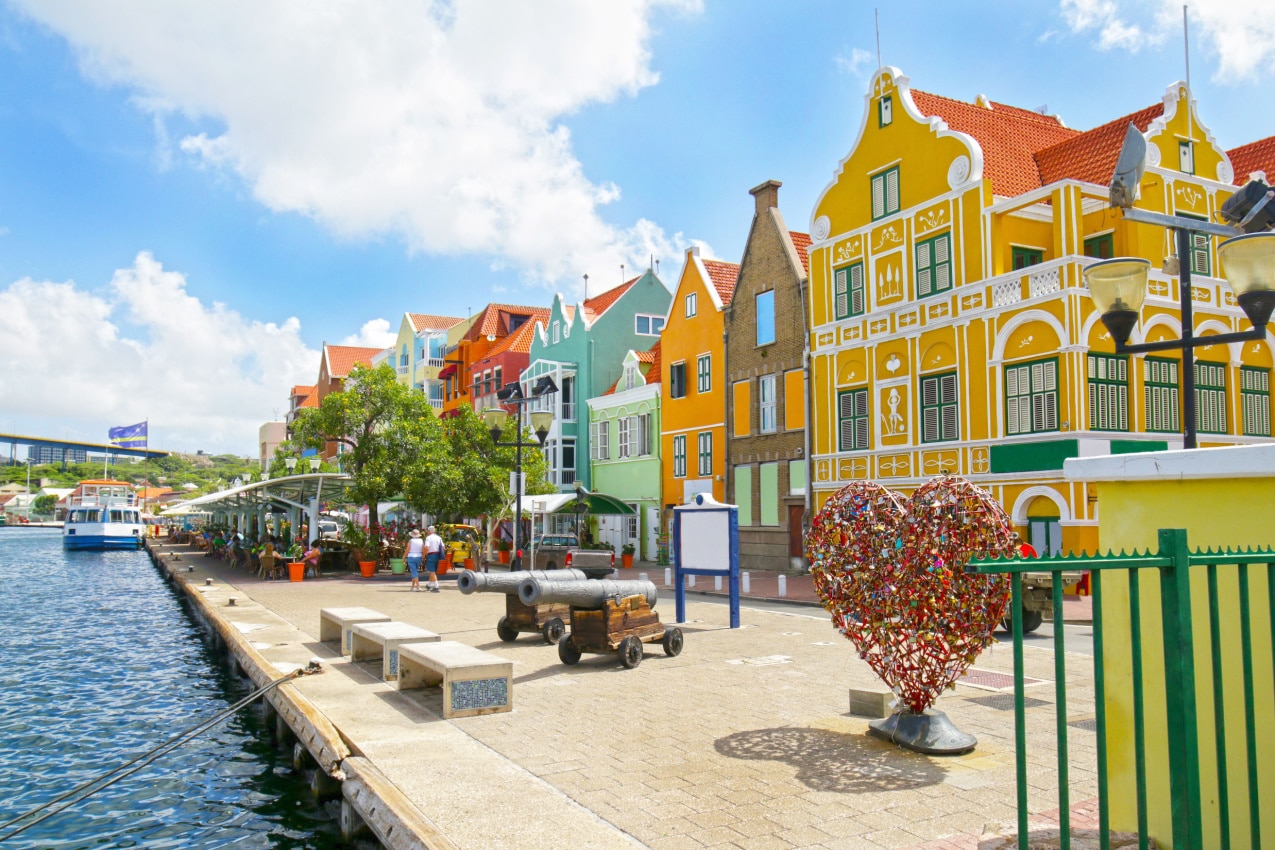
Here’s a short preview of Curacao’s safety:
- Travel advisory: All travel advisories consider Curacao a safe destination
- Crime rate: Crime in Curacao mostly affects the local residents; tourists need only worry about petty theft and car theft
- Dangerous areas: Tourists should stay away from Stone Rich, Koraal Specht, Otrobanda, Marie Pampoen, Seru di Kandela, and Kanga—all of them located in the capital
- Police presence: Curacao has a special police force whose only job is to protect tourists
- Natural Disasters: Curacao is outside of the hurricane belt, and hence completely safe
- Public transport: It’s completely safe, but sometimes unreliable
- Medical care quality: Curacao has three fully-functioning hospitals
Travel Advisory for Curacao
The US State Department categorizes Curacao as a level-1 country, which means that travelers should only exercise normal precautions while visiting.
The travel advisory of the United States provides four categories:
- Level 1: Exercise Normal Precautions
- Level 2: Exercise Increased Caution
- Level 3: Reconsider Travel
- Level 4: Do Not Travel
The Government of Canada is on the same page as its US counterpart, giving visitors to Curacao the green light, and recommending only “normal security precautions” to potential travelers.
Finally, the Government of New Zealand issues no specific travel advisory for the Netherlands Antilles (that Curacao is a part of), meaning that they consider it safe.
That being said, no country is without crime or without its problems. According to the travel advisories, here’s what you need to know about crime on the island:
- Crimes of opportunity and petty thefts, such as pickpocketing and purse snatching, could affect tourists.
- There’s a continuously increasing problem of car theft.
- Violent crime is rare and mostly happens away from the tourist hotspots, mainly affecting the local population.
- The most common cause of violence stems from drug trafficking disputes between criminal organizations.
A Comprehensive Look at Curacao Crime Rates
Curacaos is as safe as Aruba and Bonaire, which are considered to be two of the safest islands in the Caribbean.
But let us showcase that through crime stats, crime types, and what it all means for you as a tourist.
Crime Statistics
The numbers offered by the highly relevant and accurate Curacao’s Central Bureau of Statistics (from 2012 to 2022) vouch for Curacao’s relative safety.
| Type of crime | 2012 | 2013 | 2014 | 2015 | 2016 | 2017 | 2018 | 2019 | 2020 | 2021 | 2022 |
| Life offenses | 29 | 21 | 22 | 21 | 19 | 27 | 21 | 19 | 13 | 10 | 8 |
| Car thefts | 338 | 254 | 423 | 355 | 241 | 422 | 197 | 283 | 237 | 283 | 158 |
| Violent crimes (against life) | 503 | 546 | 685 | 641 | 516 | 482 | 336 | 407 | 270 | 386 | 168 |
| Robbery | 89 | 141 | 100 | 144 | 87 | 110 | 80 | ||||
| Firearms seized | 111 | 152 | 128 | 103 | 80 | 84 | 74 | ||||
| Business burglaries | 257 | 275 | 248 | 200 | 95 | 118 | |||||
| Home burglaries | 495 | 562 | 665 | 292 | 184 | 204 |
As you can see from the table, the most common crimes are property crimes, with a reassuring drop in cases over the years. The number of violent crimes also has been continuously dropping in the last ten years. The number of life offenses even reached an all-time low in 2022 when only eight cases in total.
Dangerous Areas in Curacao
Stay away from:
- Stone Rich
- Koraal Specht (the headquarters of the No Limit Soldiers)
- Otrobanda
- Marie Pampoen
- Seru di Kandela
- Kanga
These locations are impoverished and known sites of inter-gang violence.
Police Presence in Curacao
Curacao is protected by the Curacao Police Force (Korps Politie Curacao). You can contact them via the regular 911 number.
Aside from the official police force, the island also has a special police force—Politur, specifically trained to help tourists. They speak multiple languages—usually fluent in English, Dutch, and Spanish. The headquarters of the Politur are located in Mambo Beach and the World Trade Center.
You can contact them on the following numbers:
- Mambo Beach Office: +(5999) 735-0044
- World Trade Center Office: +(5999) 463-6542
Also, because of their widespread drug problem which has international consequences, INTERPOL has offices in the capital of Curacao, Willemstad.
The country’s official website gives the following advice in relation to their police force which you might find useful: “If you have questions or need assistance you can always approach them and they can usually answer you in English, Dutch, and Spanish. If a police officer gives you an order please be sure to follow it as quickly as possible, just like you would at home.”
But, the US State Department shares this valuable piece of advice: “Do not rely on hotels, restaurants, or tour companies to make the police report for you.”
Is it Safe to Travel Solo in Curacao?
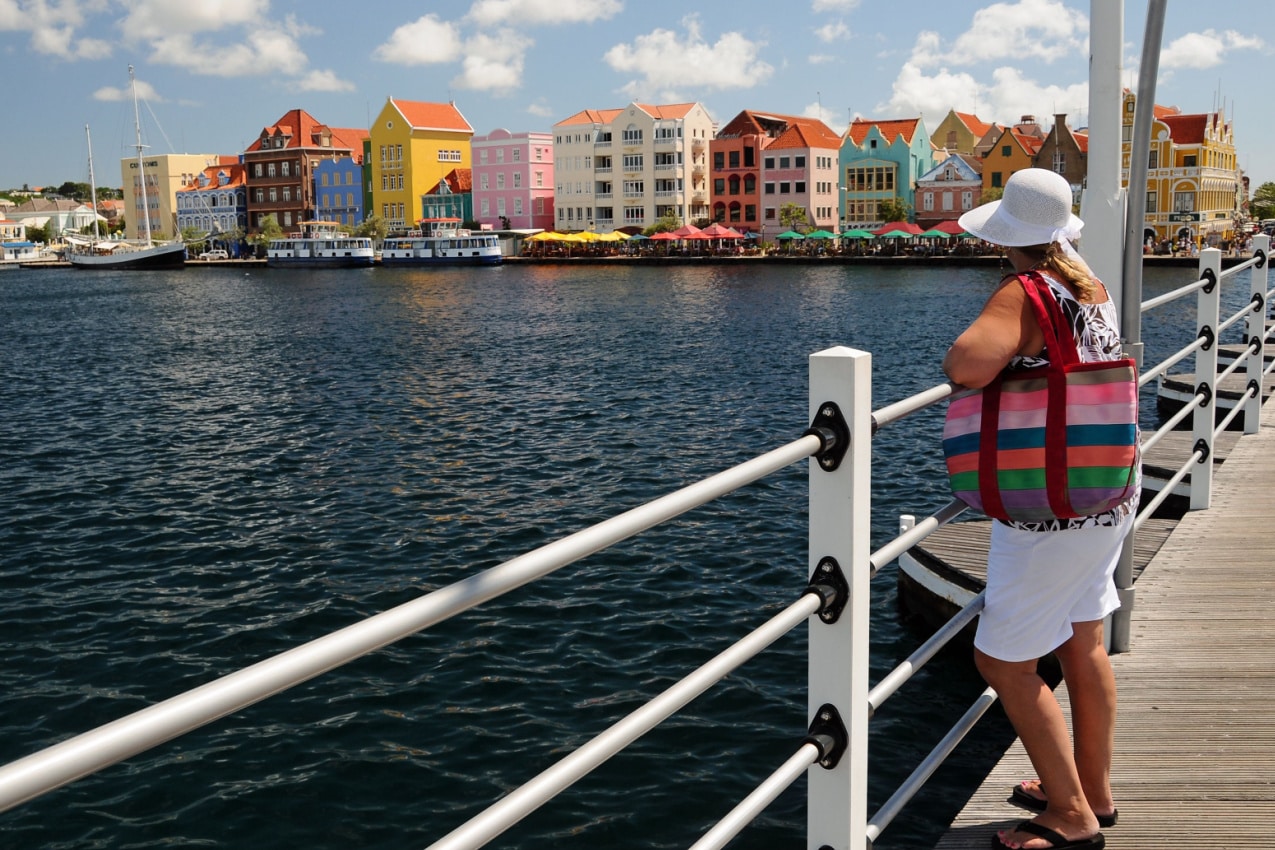
Curacaos is a great destination for solo travelers: it’s a safe and welcoming place, and there’s no need for any special or additional safety precautions, aside from following your common sense and intuition.
But, according to the Government of Canada, solo women travelers “may be subject to some forms of harassment and verbal abuse.”
The Canadian travel advisory gives the following useful tips for lone female visitors to Curacao:
- Always stay in touch with your family and friends
- Keep the battery on your phone charged at all times
- Be particularly careful during the night
- Don’t leave your drinks unattended
- Use (whenever possible) women-only transportation, such as women-only buses
- If someone tries to steal from you, don’t resist as the person may be armed
Is it Safe to Travel to Curacao as a Family?
Curacao is completely safe for families and small children.
But there’s one additional piece of information that you should be aware of. Namely, Curacao has a very strict policy for the entry and exit of visitors under 18 years of age. Because of that, children entering the island are required to present the following documents, as indicated by the Government of Canada:
- Birth certificate, identity documents, as well as travel documents
- Identity document(s) of the parent(s) or guardian, having authority to give consent to travel
- Documents proving who is the legal representative of the traveling minor
- Fully completed consent form, signed by the parent(s) traveling, designating the accompanying adult during the stay
Aside from that, there’s nothing in particular that you should worry about.
Perils of Nature: The Risk of Natural Disasters in Curacao
The risk of a hurricane hitting Curacao is extremely small.
According to the UK’s official travel safety advisory: “most hurricanes pass well to the north of Curaçao, which has no record of a recent major hurricane. There are occasional tropical storms.”
The hurricane season in the Caribbean generally starts in May or June and lasts until the end of November. But Curacao, like the other Leeward Islands, is geographically outside the hurricane belt.
While the rest of the Caribbean is particularly hurricane-prone during that part of the year, Curacao only experiences increased temperatures, since most of the wind passes through the other islands. That basically means that while huge storms happen a few kilometers to the north of your hotel, you’re only going to sweat your pants off.
According to WorldData.info, the last hurricane to hit Curacao was Bret on June 23, 2023. But, it only reached a maximum speed of around 83 km/h, so according to the Saffir-Simpson classification, Bret is not even a level-1 hurricane. It didn’t cause any considerable damage, nor endanger any lives.
Either way, it’s better to be safe than sorry. The smartest thing you can do while staying anywhere in the Caribbean is to follow the updates of the National Hurricane Center and the warnings of the World Meteorological Organization. That way, you can always be prepared for the worst, even if the worst never comes.
Beware the Silent Threat: Carbon Monoxide Poisoning in Curacao
There are no known cases of carbon monoxide poisoning in Curacao.
But that shouldn’t stop you from being wary. After the highly-publicized case of the poisoning of three American tourists in the Sandals Resort in the Bahamas, there’s increased caution in the Caribbean regarding the invisible, odorless, and tasteless gas.
As you can’t be 100% certain that the hotel you’re staying at is doing everything to protect you against potential carbon monoxide poisoning, the best thing to do is buy a portable CO detector (which costs only around 20$) and bring it along on your trip.
Curacao Weather Patterns: What to Expect
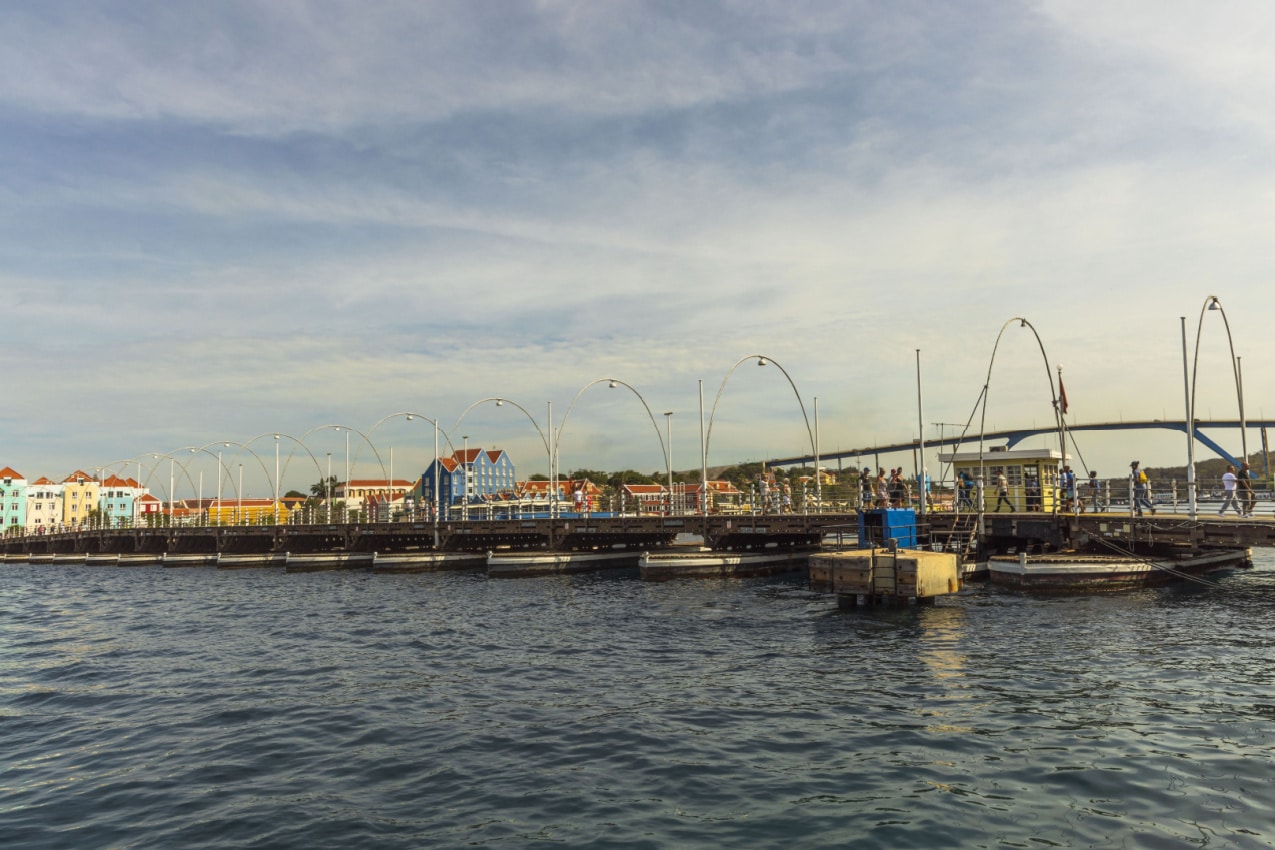
Curacao has a tropical semi-arid climate. Like most tropical countries, it has dry and wet seasons. Unlike most tropical countries, the changes in weather between the two are not as strongly pronounced in Curacao.
Generally speaking, the weather is sunny throughout the whole year—it’s a rare thing for the rain to linger through the whole day, even during the wet season. Intense but short showers usually happen either in the early morning or in the late evening.
Here are some quick facts about the weather in the country:
- The average temperature throughout the whole year fluctuates between 86°F and 91°F (30°C and 33°C)
- The south-east trade winds blow between February and August and bring dry weather from South America
- The more intense north-east trade winds blow between October to January and usually bring rain
- The warmest months are August, September, and October, while the coldest months are December, January, February, and March
- February through June are the driest, while October, November, and December are the wettest months of the year. January, July, August, and September are somewhere in between
- The average annual temperature of the water is 80°F (27°C)
- The humidity stays constant, around 70%, throughout the whole year
- The average yearly rainfall is no more than 22 inches
Monthly Average Temperatures and Rainy Days in Willemstad, Curacao
| Month | Temperature (High and Low) | Rainy Days |
| January | 76° / 86°F (24 / 30°C) | 8 days |
| February | 76° / 87°F (24 / 30°C) | 6 days |
| March | 77° / 87°F (25 / 31°C) | 2 days |
| April | 78° / 89°F (25 / 31°C) | 2 days |
| May | 79° / 90°F (26 / 32°C) | 2 days |
| June | 80° / 90°F (26 / 32°C) | 3 days |
| July | 79° / 90°F (26 / 32°C) | 6 days |
| August | 80° / 91°F (26 / 33°C) | 5 days |
| September | 80° / 92°F (26 / 33°C) | 5 days |
| October | 79° / 90°F (26 / 32°C) | 8 days |
| November | 78° / 89°F (25 / 31°C) | 11 days |
| December | 78° / 89°F (25 / 31°C) | 11 days |
How to Stay Safe in Curacao
- According to Dutch law, you must always carry your ID
- It’s prohibited by law to take corals or conch seashells out of the country
- Turning right on red lights is prohibited
- The island’s currency is the Netherlands Antillean guilder (ANG), but they usually accept US dollars
- The UK’s travel advisory warns against leaving your bag unattended at the airport, because you may unintentionally be used as a mule by gangs and criminals that smuggle illegal substances from South America to Europe and the USA
- Stay away from dodgy and dangerous areas
- Never leave your stuff, especially bags, unattended in hotel lobbies
- Be particularly careful with your belongings during the carnival season
- Never leave any valuable belongings in your car unattended
- Don’t consume or purchase illegal substances: it could put you in dangerous contact with gangs, and fines are very high
Wildlife Precautions
Although Curacao isn’t home to any particularly blood-thirsty animals, there are some that can really hurt you, like poisonous snakes, scorpions, centipedes, and wild boars. Because of that, Canada’s travel advisory provides some additional wildlife safety precautions, mostly applicable to visitors of the two national parks in Curacao, Christoffel National Park and Shete Boka National Park:
- Always keep a safe distance between you and the animal
- While exploring wilder areas, never leave the car without direct permission from the travel guide
- Closely follow the park’s regulations or the warden’s orders
Emergency Numbers
For emergency services in Curacao, dial:
- Police: 911
- Ambulance/EMS: 912
- Fire Department: 911
- Coastal Guard: 913
Public Transportation Safety in Curacao
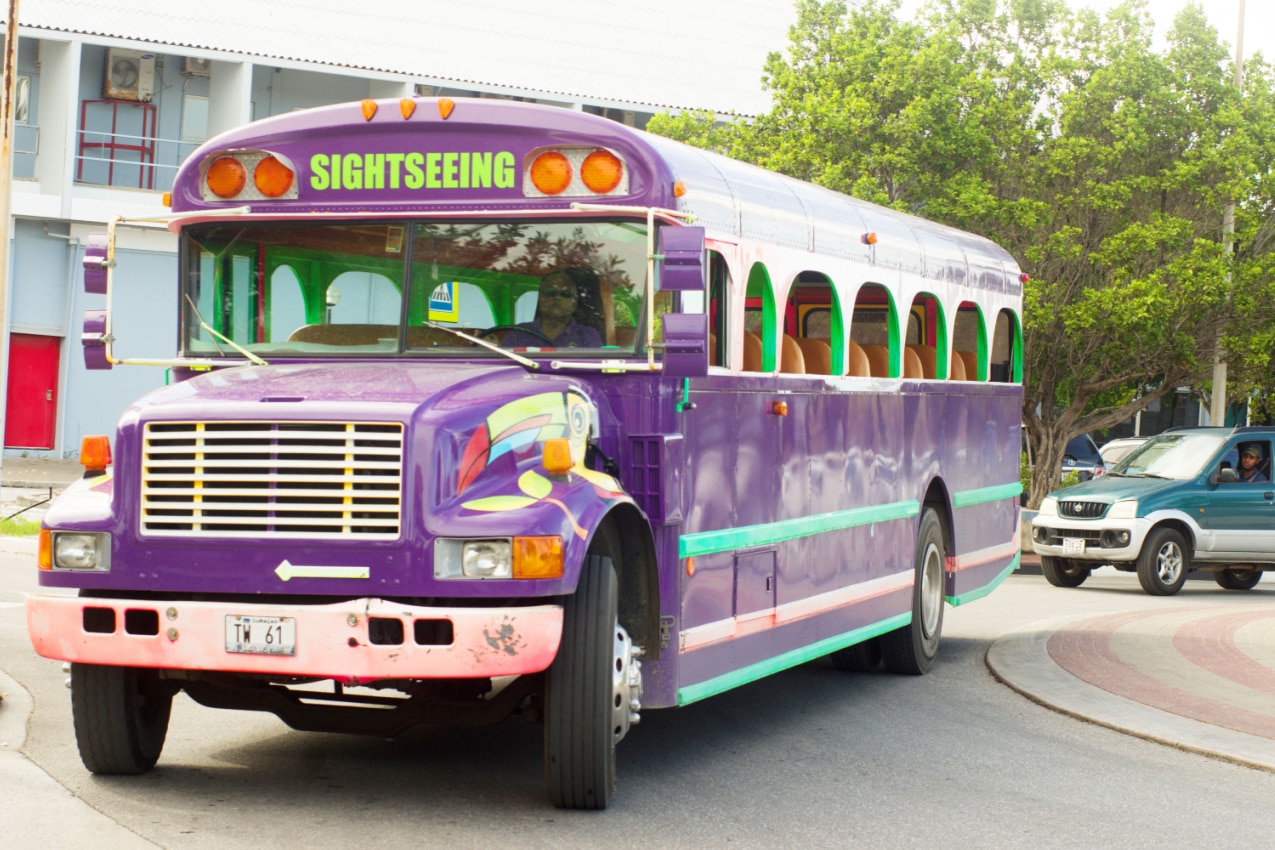
Public transportation is generally safe in Curacao. But there are some particularities that you should be aware of.
There are basically three public transportation options in Curacao:
- City buses
- Minibusses
- Taxis
None of these transportation options pose any safety concerns. You can use them by yourself or with your family without concern.
The city buses in Curacao are well-maintained. They operate on fixed routes, running on the hour through the day. There are two major bus stations in Curacao: Punda (tel +5999 – 641 6257) and Otrobanda (tel +5999 – 462 8359).
Minibusses, on the other hand, run more frequently and are generally available throughout the whole day. But, they don’t have fixed routes and schedules. Every minibus has its own schedule and route which is displayed on its windshield, on the front of the vehicle.
You don’t have to be afraid of unlicensed taxis in Curacao, since all taxi cabs must possess a license. You can easily notice them by the “TX” mark on their license plates.
That being said, there’s one thing to keep in mind: taxis in Curacao are not metered. Every taxi driver has a rate sheet that determines the price according to location and distance. That means that you always have to negotiate the price upfront. One more interesting fact is that taxi drivers can and usually serve as tour guides for tourists, and can take them to different parts of the island.
Finally, if you want to avoid public transport and prefer renting a car, you’re in luck! The roads in Curacao are in good condition. However, after rainfall, they do tend to get a bit slippery. Also, wandering animals can pose a danger on roads, so don’t speed and slow down on sharp curves in the road. Finally, road signs are rare on the island.
The Quality of Medical Care in Curacao
According to the Canadian travel advisory, “medical care in Curacao is generally good but may be limited in availability.”
There are three medical care facilities in Curacao:
- Curaçao Medical Center—the largest and most developed hospital on the island which boasts both emergency rooms and intensive care
- Taams Clinic—significantly smaller, but also sufficiently equipped for routine procedures
- The Antillean Adventist—smaller and less developed, but still offers all the regular medical services
In case you find yourself in a medical emergency, the attending doctor will decide, on the spot, which hospital is best suited to handle the situation.
The Government of Canada shares a couple more tips for tourists in Curacao:
- The hospital on the island may require immediate cash payment for their services
- In the worst-case scenarios, medical evacuation to another country is likely to be very expensive
- The best thing you could do is to travel with medical insurance that covers any potential expenses
Curacao, Here We Come!
To come full circle, let’s reiterate: Curacao is a safe place for tourists and a wonderful holiday destination for both solo travelers and families.
Potential problems tourists may encounter are car theft and petty theft. The public transport is safe and reliable, and the medical institutions, although small in number, are well-equipped. Finally—the weather is great throughout the year and the chance of hurricanes hitting the island is very low.
As long as you keep your eyes wide open, your valuables near you, and avoid dodgy neighborhoods, you’re most likely to have an incident-free vacation in Curacao!
